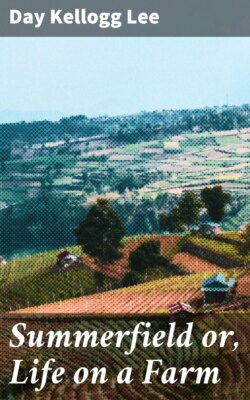Читать книгу Summerfield or, Life on a Farm - Day Kellogg Lee - Страница 8
На сайте Литреса книга снята с продажи.
HOME IN THE BACKWOODS.
ОглавлениеA new home in the backwoods! Living where the dun deer roam, and wild fowl flock! Sleeping a-nights where waters murmur, wolves howl, and panthers scream in your hearing; and whip-poor-wills sing till morning comes, and Nature appears in her gladness and pride! Who would not enjoy a scene like that for a season, forgetting the tame monotony of towns, and imprisonment of cities? Who would not forsake a room amid walls of brick for a green woodland parlor? And leave velvet cushion and costly carpet, for a cushion of moss, and a carpet of flowers in the virgin wilderness? Follow me, then, to the Land of Lakes, and ramble abroad with my hero, while he explores the Waldron Settlement.
A rare and yellow August evening it was, and about fifty years ago, when Matthew Fabens arrived in the Lake Country. As he rose the first morning, and went forth to survey the region of his new home, thoughts of his distant abode awakened feelings of sadness, but other sensations very soon succeeded, and balanced his mind into satisfaction. A wilderness indeed it was that waved around him; and the manners of the settlers partook as much of its wildness, verdure, freedom, and wealth, as if they had sprung like the oaks and chestnuts, from the soil; and he found it a region opening upon him, at every step, some new delight or interest.
That particular section was called the Lake Country, from the occurrence of seven lakes, that shine out from their green borders like mirrors reflecting the face of heaven. That beautiful sisterhood of little inland seas lie along in lines nearly parallel, with ten and a dozen miles of lovely woodland waving between them; and they vary in length from ten to forty miles; and discharge their waters, through the Oswego River, into Lake Ontario. Their names are, Otisco, Skaneateles, Owasco, Cayuga, Seneca, Wawumkee, and Canandaigua, each name of them sounding the rich, wild music of the Indian tongue.
On the banks of the Cayuga Fabens found the settlement, and language cannot describe the charms of its fine scenery. Few were the clearings, and small, which as yet had been made, and tall and grand were the beeches and maples, the oaks and chestnuts, that tossed their arms on high. Fabens gave way to the excitement cast upon his sensitive nature, and allowed himself little rest for a fortnight. Each day was too brief to accomplish all he purposed. He took long rambles in the woods, sensing the sanctity of their venerable shade, enjoying the views they spread to his gaze, and tasting the fragrance of hemlock, birch, and pine, that floated to him in mingled odors. All he had heard was more than true. The trees were noble beyond description. There were narrow openings and plains, in places, where the sumac lifted its blood-red plumes, and bee-balm waved its crimson blossoms; while generally the woods were dense and magnificent.
Through opening and thicket the wild deer bounded like forms of beauty in a dream; squirrels were chattering, robins and thrushes were singing in gladness and pride; and wild fowl were sporting in water and air. he went out to the fallows, and they were covered with Indian corn, or gilded with yellow stubble; with here and there a garden studded with cool and lusty melons, almost bursting with delicious sweets. He descended the low valleys, and there, as on the hills, sprang thickly-clustering bushes of large and melting blackberries, inviting him to taste and enjoy. He followed the courses of the creeks, and found them teeming with trout and pickerel, as playful as the scampering fawns, all mottled with gold and silver, and royal as the peacock's plumes in the running changes of their lustre. He stood on the margin of the lake that lay placidly sleeping in the embrace of hills; and the willow waved on its borders, and wild ducks and herons wantoned on its breast. The waters were so transparent he could count the white pebbles and shells at the depth of thirty feet; and they were pure and sweet as the dew that lay all night on the wild honeysuckles and roses, which graced the upland plains.
There was the hunting-ground of the Indians, and wigwams dotted the shore; while on its waters, floating and ducking like the wild fowl, sported the Indian canoes. He visited the rude homes of the settlers, and was welcomed to each hearth with that rough and liberal hospitality, which leaps from the soul of forest life. Several of them had known his father on the Hudson, and all were soon his heartiest friends. A frolic in the greenwood chase was proposed for every day in two weeks to come; and gatherings and feasts were had without number. All were near neighbors, though dwelling five miles apart; all carried the spirit of the country, with the breath of its free air, and the image of its woods and lakes in their hearts; and one flowing soul of brotherhood was shared, while one ardent feeling of honest kindness, and jocund spirit, bound them in a fellowship fast and warm.
The autumn passed; the winter came, and retired; and spring succeeded, casting abroad her blooms and blessings; and the woodlands echoed with music, and nature smiled like a garden gay. And more sensible of sights and influences of beauty, Fabens enjoyed the genial season with new satisfaction, and determined that there should be his future home. He bargained for a farm of a hundred acres, and commenced its improvement, cutting the first tree with his own hands, and selecting, on an opening he had made, the site for a log house. On the approach of summer, by a neighbor who returned to the Hudson, he sent his parents the following letter:—
